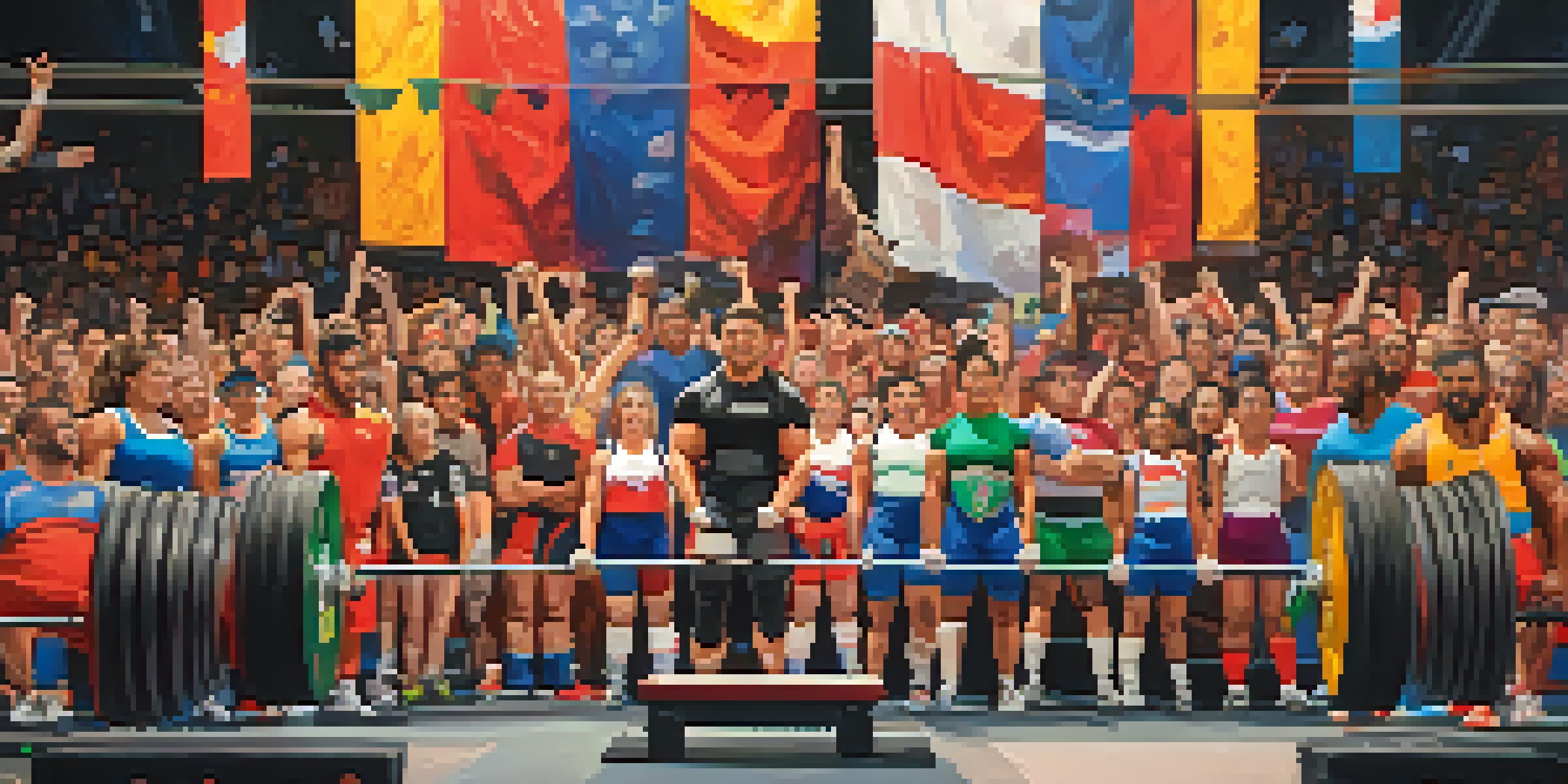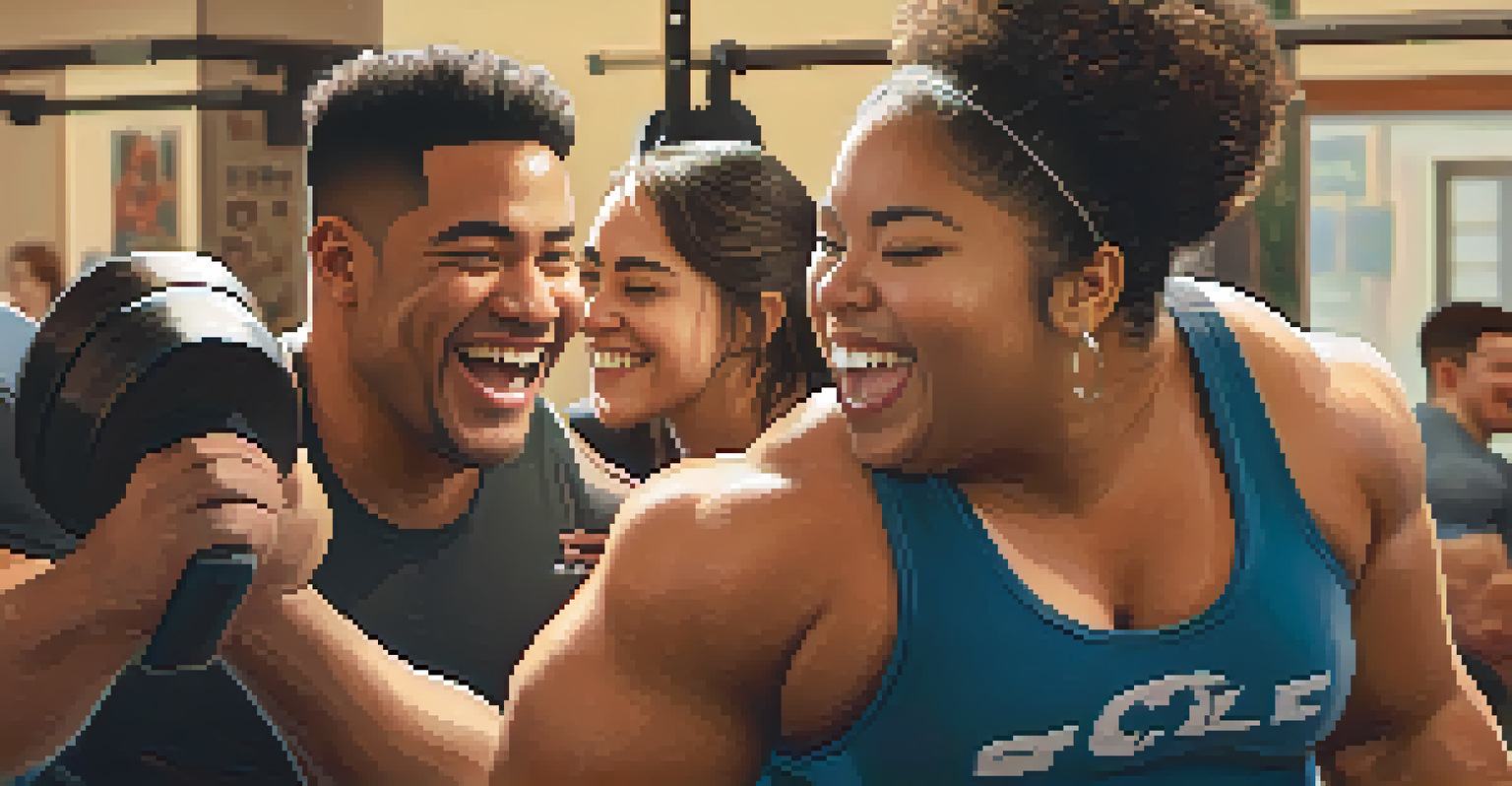Powerlifting's Rise in Popular Culture: A Modern Phenomenon

The Evolution of Powerlifting in the Last Decade
Over the past decade, powerlifting has transitioned from a niche sport to a mainstream phenomenon. With its focus on three key lifts—squat, bench press, and deadlift—it's captured the attention of fitness enthusiasts worldwide. Social media platforms like Instagram and TikTok have played a pivotal role, showcasing athletes and their impressive feats. This visibility has not only inspired many to take up the sport but also sparked conversations about strength training in general.
Strength does not come from physical capacity. It comes from an indomitable will.
As fitness influencers and athletes share their journeys, the stigma surrounding powerlifting has diminished. People are now more open to exploring the strength-based training that powerlifting offers. The community aspect, often highlighted in online forums and local gyms, fosters a welcoming environment for beginners. This camaraderie has been instrumental in drawing in newcomers who might have previously felt intimidated by the sport.
Moreover, powerlifting's adaptability to different fitness levels makes it accessible. Whether someone is just starting their fitness journey or is a seasoned athlete, powerlifting provides a structured way to build strength. This inclusivity has contributed significantly to its rise in popularity, as individuals from various backgrounds and fitness levels can participate and thrive.
The Influence of Social Media on Powerlifting
Social media has revolutionized how powerlifting is perceived and practiced. Platforms like Instagram and YouTube serve as stages where lifters can showcase their skills, share training tips, and connect with like-minded individuals. This exposure has enabled powerlifting to break out of traditional gym settings and reach a broader audience. Through hashtags and viral challenges, lifters have cultivated a vibrant online community that encourages participation and support.

Additionally, the rise of fitness influencers has played a key role in popularizing powerlifting. Many influencers incorporate powerlifting techniques into their routines, demonstrating their effectiveness while also making them aesthetically appealing to their followers. This blending of strength training with lifestyle content has made powerlifting more relatable and less intimidating for those considering it. Many aspiring lifters now see these athletes as role models, further fueling the sport's growth.
Powerlifting Goes Mainstream
Over the last decade, powerlifting has gained immense popularity, fueled by social media and a welcoming community.
Moreover, social media has democratized education around powerlifting. Online tutorials and coaching sessions are readily available, breaking down complex techniques into digestible content. This accessibility allows anyone to learn proper form and training strategies, making it easier for newcomers to join the community. As a result, powerlifting has not only gained popularity but has also elevated the overall knowledge and skill level within the sport.
Powerlifting Competitions: More Than Just Lifting
Powerlifting competitions have evolved into exciting events that celebrate strength and community. These gatherings provide a platform for lifters to showcase their hard work and dedication in front of an audience. Beyond the lifting itself, competitions foster a sense of belonging and camaraderie among participants. Spectators cheer for lifters regardless of their affiliation, creating a supportive atmosphere that is palpable throughout the event.
The only bad workout is the one that didn't happen.
Furthermore, powerlifting competitions often include various categories, allowing individuals of all ages and skill levels to participate. From novice lifters to seasoned veterans, the inclusivity of these events encourages a diverse range of competitors. This variety not only highlights the sport's accessibility but also emphasizes the personal journeys of each lifter. Many competitors share their stories, showcasing how powerlifting has transformed their lives, which adds a compelling narrative to each event.
In recent years, there has also been a trend toward live-streaming these competitions, expanding their reach to audiences worldwide. This visibility allows fans to engage with the sport from the comfort of their own homes. As more people tune in to watch these events, interest in powerlifting continues to grow, further solidifying its place in popular culture.
The Role of Women's Empowerment in Powerlifting
Women’s participation in powerlifting has seen a significant increase, reflecting broader trends in fitness and empowerment. As more women embrace strength training, they challenge traditional norms about femininity and fitness. This shift has made powerlifting an appealing option for women looking to build strength and confidence. Many female lifters highlight how the sport has transformed their self-image, inspiring others to follow suit.
Social media plays a crucial role in promoting female powerlifters, showcasing their strength and achievements. Influential athletes share their journeys, breaking down stereotypes and encouraging women to explore their own strength. This visibility has led to a growing number of women participating in competitions, fostering a supportive community that celebrates their accomplishments. As more women lift heavy and proudly share their stories, they inspire a new generation of female athletes.
Social Media Empowers Lifters
Platforms like Instagram and YouTube have transformed how powerlifting is shared and practiced, making it more accessible and relatable.
Moreover, the rise of female powerlifting competitions underscores this empowerment movement. These events provide a platform for women to showcase their skills and strength, further validating their place in the sport. As female powerlifters continue to break records and earn recognition, they pave the way for future generations. This momentum not only enhances the sport's popularity but also contributes to a broader cultural shift toward strength and empowerment for women.
Powerlifting and Mental Health: A Strong Connection
The connection between powerlifting and mental health is increasingly recognized, as strength training provides numerous psychological benefits. Many lifters report feeling empowered and confident after a successful lift, which can have a positive impact on their overall mental well-being. The discipline and focus required in powerlifting can also serve as a form of therapy, offering a constructive outlet for stress and anxiety in today’s fast-paced world.
Moreover, the powerlifting community often serves as a support system for its members. Lifters share their struggles and victories, creating an environment where mental health is openly discussed. This camaraderie fosters a sense of belonging, encouraging individuals to seek help when needed. As mental health awareness continues to grow, the supportive nature of the powerlifting community plays a crucial role in promoting overall well-being.
Additionally, incorporating powerlifting into fitness routines has been linked to improved self-esteem and body image. As individuals progress in their training, they often experience a shift in how they view their bodies and capabilities. This positive transformation not only enhances their physical health but also reinforces their mental resilience. The fusion of strength training with mental health benefits underscores the holistic approach that powerlifting embodies.
The Impact of Powerlifting on Fitness Trends
Powerlifting has significantly influenced fitness trends, encouraging a shift towards strength training over traditional cardio workouts. As more people recognize the benefits of lifting heavy weights, gyms are adapting their offerings to include powerlifting-specific programs and classes. This growing interest reflects a broader understanding of fitness that emphasizes strength, functionality, and overall health. Powerlifting's rise has introduced many to the concept that strength training can be both effective and enjoyable.
Moreover, powerlifting has inspired the creation of various hybrid training programs that blend different fitness modalities. Many fitness enthusiasts are now incorporating elements of powerlifting into their routines, combining heavy lifting with other forms of exercise like cardio or mobility work. This fusion allows individuals to enjoy the benefits of strength training while still pursuing their personal fitness goals. The versatility of powerlifting has made it a valuable addition to many fitness regimens.
Strength Training Boosts Mental Health
Powerlifting not only builds physical strength but also fosters mental resilience and community support among its participants.
As powerlifting continues to gain traction, it encourages a more inclusive approach to fitness. Individuals of all shapes, sizes, and fitness levels are drawn to the idea of becoming stronger and more capable. This shift in focus not only promotes diversity within the fitness community but also challenges outdated notions of what constitutes a healthy lifestyle. Powerlifting's impact on fitness trends is undeniable, as it champions strength and resilience across all demographics.
The Future of Powerlifting in Popular Culture
Looking ahead, the future of powerlifting in popular culture appears bright and promising. As more individuals discover the joys of strength training, the sport is likely to grow even further in popularity. The ongoing support from social media, fitness influencers, and community events will continue to fuel this growth. Powerlifting is poised to become a staple in the fitness landscape, appealing to a diverse audience across various demographics.
Moreover, as discussions around health and fitness evolve, powerlifting's emphasis on strength and mental well-being will resonate with many. The sport's ability to foster community and support will attract newcomers seeking connection and empowerment. With a growing focus on holistic health, powerlifting aligns perfectly with the idea that fitness is not just about appearance but also about how individuals feel and function in their daily lives.

In summary, the rise of powerlifting in popular culture reflects a broader societal shift toward embracing strength and resilience. As it continues to gain traction, there is no doubt that powerlifting will maintain its place as a significant part of the fitness narrative. The sport's ability to empower individuals and foster community will ensure its relevance for years to come.